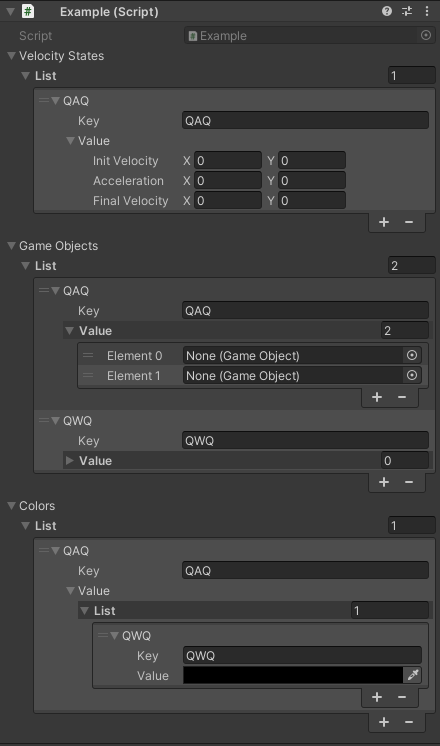1
2
3
4
5
6
7
8
9
10
11
12
13
14
15
16
17
18
19
20
21
22
23
24
25
26
27
28
29
30
31
32
33
34
35
36
37
38
39
40
41
42
43
44
45
46
47
48
49
50
51
52
53
54
55
56
57
58
59
60
61
62
63
64
65
66
67
68
69
70
71
72
73
74
75
76
77
78
79
80
81
82
83
84
85
86
87
88
89
90
91
92
93
94
95
96
97
98
99
100
101
102
103
104
105
106
107
108
109
110
111
112
113
114
115
116
117
118
119
120
121
122
123
124
125
126
127
128
129
130
131
132
133
134
135
136
137
138
139
140
141
142
143
144
145
146
147
148
149
150
151
152
153
154
155
156
157
158
159
160
| using System;
using System.Collections;
using System.Collections.Generic;
using System.Linq;
using UnityEngine;
public class SDictionary { }
[Serializable]
public class SDictionary<TKey, TValue> : SDictionary, ISerializationCallbackReceiver, IDictionary<TKey, TValue>
{
[SerializeField] private List<SKeyValue<TKey,TValue>> list = new List<SKeyValue<TKey, TValue>>();
private Dictionary<TKey, int> KeyPositions => _keyPositions.Value;
private Lazy<Dictionary<TKey, int>> _keyPositions;
public SDictionary()
{
_keyPositions = new Lazy<Dictionary<TKey, int>>(MakeKeyPositions);
}
private Dictionary<TKey, int> MakeKeyPositions()
{
var dictionary = new Dictionary<TKey, int>(list.Count);
for (var i = 0; i < list.Count; i++)
{
dictionary[list[i].Key] = i;
}
return dictionary;
}
public void OnBeforeSerialize() { }
public void OnAfterDeserialize()
{
_keyPositions = new Lazy<Dictionary<TKey, int>>(MakeKeyPositions);
}
#region IDictionary<TKey, TValue>
public TValue this[TKey key]
{
get => list[KeyPositions[key]].Value;
set
{
var pair = new SKeyValue<TKey,TValue>(key, value);
if (KeyPositions.ContainsKey(key))
{
list[KeyPositions[key]] = pair;
}
else
{
KeyPositions[key] = list.Count;
list.Add(pair);
}
}
}
public ICollection<TKey> Keys => list.Select(tuple => tuple.Key).ToArray();
public ICollection<TValue> Values => list.Select(tuple => tuple.Value).ToArray();
public void Add(TKey key, TValue value)
{
if (KeyPositions.ContainsKey(key))
throw new ArgumentException("An element with the same key already exists in the dictionary.");
else
{
KeyPositions[key] = list.Count;
list.Add(new SKeyValue<TKey, TValue>(key, value));
}
}
public bool ContainsKey(TKey key) => KeyPositions.ContainsKey(key);
public bool Remove(TKey key)
{
if (KeyPositions.TryGetValue(key, out var index))
{
KeyPositions.Remove(key);
list.RemoveAt(index);
for (var i = index; i < list.Count; i++)
KeyPositions[list[i].Key] = i;
return true;
}
else
return false;
}
public bool TryGetValue(TKey key, out TValue value)
{
if (KeyPositions.TryGetValue(key, out var index))
{
value = list[index].Value;
return true;
}
else
{
value = default;
return false;
}
}
#endregion
#region ICollection <KeyValuePair<TKey, TValue>>
public int Count => list.Count;
public bool IsReadOnly => false;
public void Add(KeyValuePair<TKey, TValue> kvp) => Add(kvp.Key, kvp.Value);
public void Clear() => list.Clear();
public bool Contains(KeyValuePair<TKey, TValue> kvp) => KeyPositions.ContainsKey(kvp.Key);
public void CopyTo(KeyValuePair<TKey, TValue>[] array, int arrayIndex)
{
var numKeys = list.Count;
if (array.Length - arrayIndex < numKeys)
throw new ArgumentException("arrayIndex");
for (var i = 0; i < numKeys; i++, arrayIndex++)
{
var entry = list[i];
array[arrayIndex] = new KeyValuePair<TKey, TValue>(entry.Key, entry.Value);
}
}
public bool Remove(KeyValuePair<TKey, TValue> kvp) => Remove(kvp.Key);
public Dictionary<TKey, TValue> ToDictionary()
{
Dictionary<TKey, TValue> dic = new Dictionary<TKey, TValue>();
foreach(var kvp in list)
{
dic.Add(kvp.Key, kvp.Value);
}
return dic;
}
#endregion
#region IEnumerable <KeyValuePair<TKey, TValue>>
public IEnumerator<KeyValuePair<TKey, TValue>> GetEnumerator()
{
return list.Select(ToKeyValuePair).GetEnumerator();
static KeyValuePair<TKey, TValue> ToKeyValuePair(SKeyValue<TKey, TValue> skvp)
{
return new KeyValuePair<TKey, TValue>(skvp.Key, skvp.Value);
}
}
IEnumerator IEnumerable.GetEnumerator() => GetEnumerator();
#endregion
}
|







